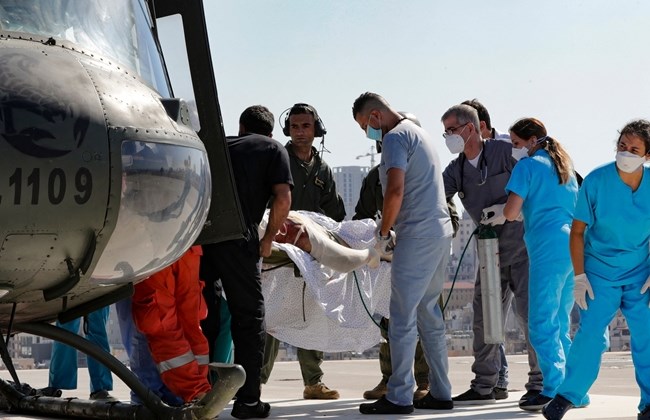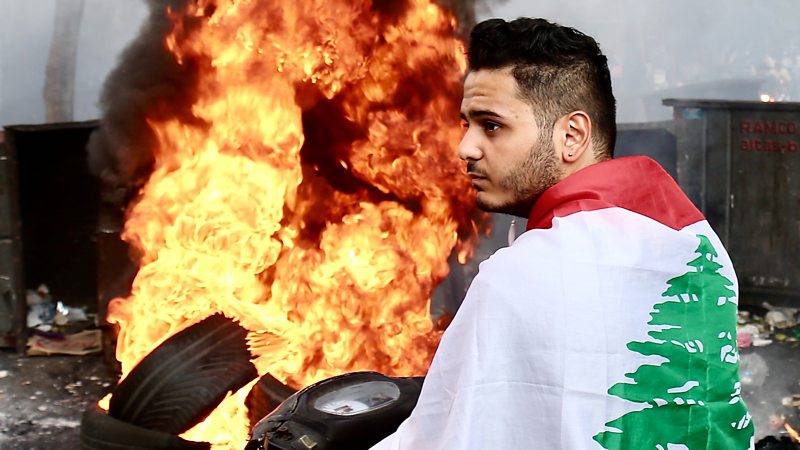www.aljazeerah.info
News, August 2020
Archives
Mission & Name
Conflict Terminology
Editorials
Gaza Holocaust
Gulf War
Isdood
Islam
News
News Photos
Opinion Editorials
US Foreign Policy (Dr. El-Najjar's Articles)
www.aljazeerah.info
|
Editorial Note: The following news reports are summaries from original sources. They may also include corrections of Arabic names and political terminology. Comments are in parentheses. |
28 People Killed in Akkar, Lebanon, in a Fuel Tank Explosion
August 16, 2021
 |
 |
| A rescue of a person burned in a fuel tank explosion in Akkar, Lebanon, August 15, 2021 | |
Lebanon reels from latest deadly explosion
The Daily Star, Agence France Presse
August 16, 2021
BEIRUT:
Lebanon reeled Monday from a deadly explosion that burned alive people desperate to fill plastic containers with fuel in a country sinking ever deeper into darkness and chaos.
At least 28 people were killed when the fuel tank, which was swarmed by residents clamouring to fill their vehicles amid crippling shortages, blew up early on Sunday in the northern region of Akkar.
The latest deadly disaster comes as Lebanon grapples with an economic crisis described by the World Bank as one of the world's worst since the 1850s.
Nearly 80 people were also injured in the blast, many of them with burns that further overwhelmed hospitals struggling to function without electricity, medics said.
On Monday, foreign countries and UN agencies were scrambling emergency aid to help exhausted health workers cope with the new influx of serious injuries and run DNA tests on the charred remains of the dead.
Shortages of key commodities have accelerated and compounded one another in recent days, leaving much of Lebanon struggling to source fuel, gas and even bread, with buying power pummeled by the currency losing more than 90 percent of its value on the black market.
The country's six million inhabitants now fear the internet and drinking water will be next to disappear.
The blast in Akkar, one of the most impoverished parts of the country, was a deadly direct consequence of a vicious cycle fast turning the region's erstwhile beacon of modernity into a failed state.
The scenes of horror piled trauma on a country still coming to terms with last year's cataclysmic Beirut port explosion that killed more than 200 people and disfigured the city.
Nobody has been held to account for the port blast, caused by the poor storage of enormous quantities of ammonium nitrate that had languished there for years.
- 'Need to leave' -
Across the country, with no more than two hours a day of mains electricity supply, many shops and restaurants remain closed, unable to source fuel for their generators.
Many private and public sector employees have been told to stay home and most of the rest have often ended up doing the same for lack of transport options.
Stuck in an endless queue of cars at a Beirut petrol station, Mohammed, who did not want to give his full name, said he could see no light at the end of the tunnel.
"We need to leave Lebanon. We all need to get out," said the 30-year-old engineer. "I've started working on it, and God help those who stay."
His six-month-old baby had cried through the sweltering night, and his family was being forced to spend hard-earned savings on operating a private generator to keep his grandmother's oxygen concentrator running.
"There's no more hope," he said.
The state has declared a national day of mourning over the Akkar blast, a move unlikely to offer much solace to a population that blamed those very authorities for the tragedy.
Angry protesters on Sunday torched the home of the landowner on whose plot the tragedy unfolded, accusing him of involvement in a hoarding and smuggling scheme allegedly covered up by top officials.
The exact circumstances of the explosion, which happened at night and as a huge crowd of people swarmed the tank, have yet to be fully established.
- 'Massacre' -
Gas station owners have been accused of hoarding fuel ahead of an expected price hike, causing crippling shortages and spawning a ruthless black market that is enriching a small cartel and choking the rest of the country.
The central bank last week warned it could no longer afford to subsidise fuel imports.
A few dozen people protested on Sunday in front of the Beirut home of Najib Mikati, who was recently appointed prime minister-designate.
The country's richest man is the third person to attempt to form a government since the last one resigned in the aftermath of the Beirut port blast last August.
Sahar Mandour of Amnesty International called the Akkar blast "a massacre resulting from an economic crisis caused by massive corruption that has been going on for years."
"The latest economic crisis didn't close the door to corruption... it aggravated it to an extent that it is now deadly," she told AFP on Monday.
The lack of a government is freezing international assistance that could help dig Lebanon out of the abyss.
As every aspect of daily life unravels, sometimes deadly scuffles have broken out at petrol stations and residents across the country fear for their safety.
"I feel like crying about everything," said Farah, a 21-year living in the mountainous Chouf region.
"I'm scared we'll get to the point where we can't leave this country, even from the airport... We only have the sea left. I feel we'll drown trying to get out," she said.
Lebanon reels from latest deadly explosion | News , Lebanon News | THE DAILY STAR
***
Lebanon deadly petrol tank blast sparks protest at PM-designate's home
BBC, August 16, 2021
Protesters attacked the home of Lebanon's prime minister-designate after a petrol tank explosion killed 27 people and injured 79 others on Sunday.
Dozens of demonstrators demanded Najib Mikati's resignation, threw stones at his house and clashed with police.
Mr Mikati said he understood "the cries of people" but condemned what he called the "unacceptable vandalism".
The army said the explosion occurred as soldiers handed out petrol seized from black marketeers in the Akkar region.
The cause of the blast was not clear, but a large crowd was gathered around the tank at the time, it added.
"We were informed that the army was distributing gasoline... so people flocked to fill it in plastic containers," Marwa al-Sheikh, whose brother Ismail was badly burned on his arms and legs, told AFP news agency.
She said some witnesses had told her that the explosion happened after someone used a lighter, but that others had claimed that shots were fired.
"The dead are victims of a careless state," she added.
Caretaker Prime Minister Hassan Diab - whose government resigned after the devastating explosion in Beirut a year ago but has not been replaced because of political deadlock - called the explosion a "tragic catastrophe" and declared a national day of mourning for Monday.
The army said it was investigating the circumstances that led to the blast and had arrested the owner of the land in the town of al-Tleil where the tank was located. Locals also reportedly set fire to his house.
Fuel is scarce in Lebanon, which is in the grips of one of the world's worst economic crises in modern times.
The currency has collapsed over the past two years, causing inflation to skyrocket, and more than half of the population live below the poverty line.
Last week, the central bank unilaterally decided to end fuel subsidies because of its dwindling reserves of foreign currency.
The government condemned the move and said fuel prices must not change.
Security forces began on Saturday to distribute fuel allegedly being hoarded by petrol stations and by individuals in tanks like the one in Akkar.
Much of Lebanon relies on private generators and the fuel shortages have left many people and institutions with just two hours of electricity a day.
Some of the hospitals who treated those injured in Sunday's explosion have warned that they may be forced to close without regular supplies of fuel.
Lebanon deadly petrol tank blast sparks protest at PM-designate's home - BBC News
***
At least 28 killed in Lebanon fuel tank explosion
Reuters, August 15, 2021
At least 28 people were killed and 79 injured when a fuel tank exploded in northern Lebanon early on Sunday, the health ministry said.
Military and security sources said that the army had seized a fuel storage tank hidden by black marketeers and was handing out gasoline to residents when the explosion occurred.
Lebanon is suffering from a severe fuel shortage, leading to long lines at gas stations and extended blackouts.
Accounts varied as to what caused the explosion, from gunfire that hit a tank of gasoline to reports that it was caused by a person who ignited a lighter.
Protesters, already angry at the economic crisis in the country, put the blame squarely on Lebanon's politicians as they demonstrated outside the prime minister's residency and hurled rocks at the building.
"Akkar was put on fire by its deputies in parliament," protesters sprayed on the building, referring to one of Lebanon's poorest areas, where the explosion occurred.
Abdelrahman, whose face and body was covered in gauze as he laid in Tripoli's al-Salam hospital, was one of those in line to get gasoline.
"There were hundreds gathered there, right next to the tank, and God only knows what happened to them," he said.
Lebanese army soldiers and Red Cross members are seen near the site of a fuel tanker explosion in Akkar in northern Lebanon, August 15, 2021. REUTERS/Omar Ibrahim
Witnesses said about 200 people were nearby at the time of the explosion. Army and security forces personnel were among the casualties, sources said.
President Michel Aoun wrote on Twitter that "this tragedy that befell our dear Akkar has made the hearts of all Lebanese bleed".
He said he had asked the judiciary to investigate the circumstances that led to the explosion.
Security forces fired tear gas to disperse the dozens of protesters outside the residency of Prime Minister designate Najib Mikati, witnesses said.
"Although I understand the cries of people and their right to protest, what happened... is not a peaceful protest but unacceptable vandalism," Mikati said in a statement.
With Lebanon deep in economic crisis, hospitals have warned that fuel shortages may force them to shut down in coming days, and have also reported low supplies of medicines and other essentials.
"The Akkar massacre is no different from the port massacre," said former Prime Minister Saad al-Hariri on Twitter, referring to last year's massive explosion at the port in Beirut.
He called on Lebanese officials including the president to take responsibility and resign.
Reporting by Walid Saleh, Omar Ibrahim, Nafisa Eltahir, Laila Bassam, and Issam Abdallah Writing by Nafisa Eltahir and Suleiman al Khalidi Editing by Cynthia Osterman, Christopher Cushing, Kim Coghill and Frances Kerry
At least 28 killed in Lebanon fuel tank explosion | Reuters
***
Share the link of this article with your facebook friendsFair Use Notice
This site contains copyrighted material the
use of which has not always been specifically authorized by the copyright
owner. We are making such material available in our efforts to advance
understanding of environmental, political, human rights, economic,
democracy, scientific, and social justice issues, etc. We believe this
constitutes a 'fair use' of any such copyrighted material as provided for
in section 107 of the US Copyright Law. In accordance with Title 17 U.S.C.
Section 107, the material on this site is
distributed without profit to those
who have expressed a prior interest in receiving the included information
for research and educational purposes. For more information go to: http://www.law.cornell.edu/uscode/17/107.shtml.
If you wish to use copyrighted material from this site for purposes of
your own that go beyond 'fair use', you must obtain permission from the
copyright owner.
|
|
|
|
||
|
||||||


